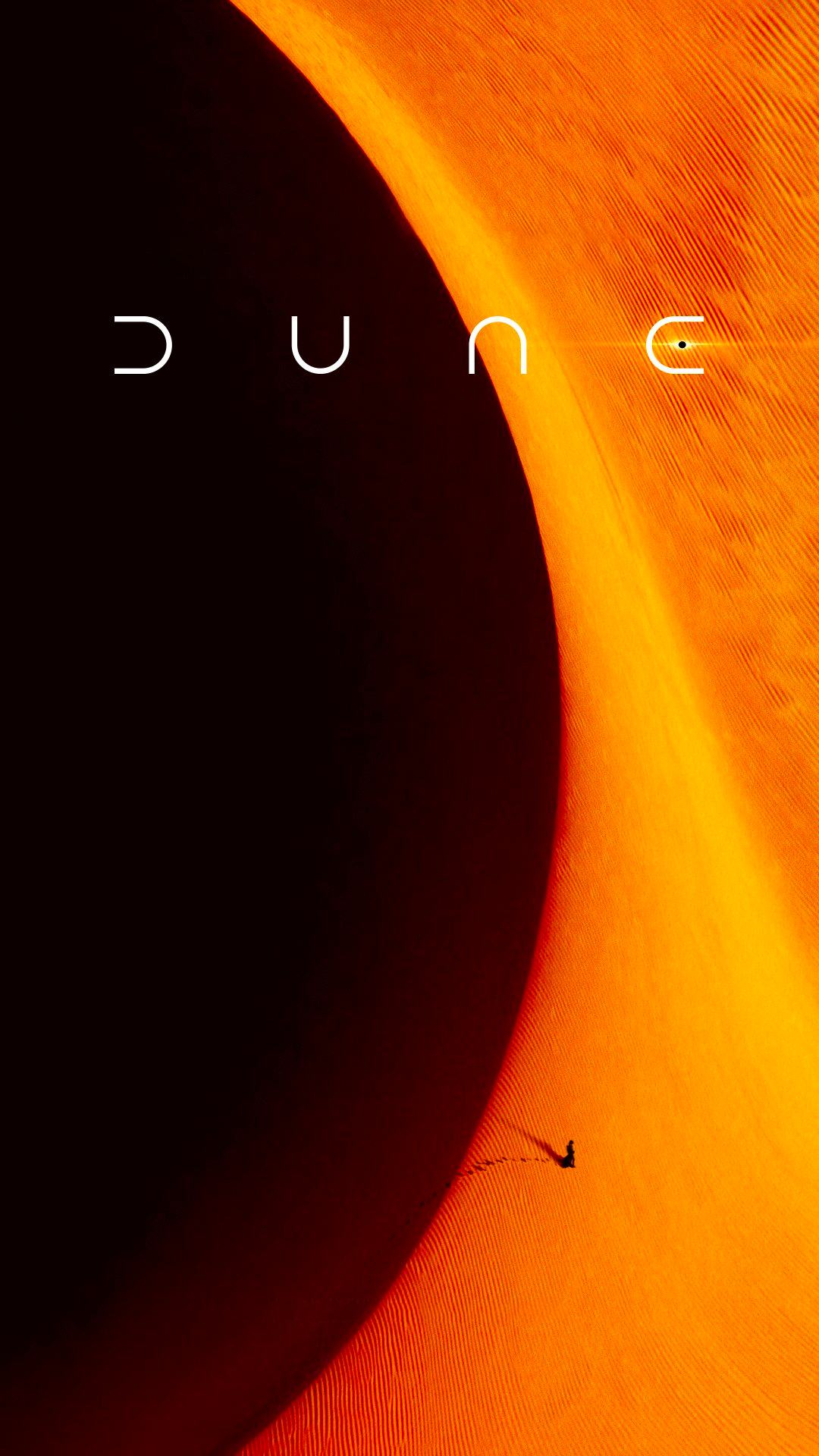
18 Oct Dune Review
DUNE
dir. Denis Villeneuve, starring Timothée Chalamet, Rebecca Ferguson, Oscar Isaac, Josh Brolin, Stellan Skarsgård, et al
Dune, the story of fate, of destiny, of the biggest treasure in the universe and the never-ending struggle to defend it, is one of the most highly regarded books in science fiction history. Themes of environmentalism, of the dangers of charismatic leaders, and of the endless political brinksmanship have captured the hearts and imaginations of readers for over half a century. The story has been adapted twice, once in a half hearted attempted by director David Lynch resulting in a bastardized mistreatment of the material, and the earnest, more faithful but micro budgeted miniseries from the Sci-Fi channel in the early 2000s. Once thought to be just as unadaptable as Tolkien’s Lord of the Rings, Dune has long stood at the crossroad of it can’t be done and oh man, but if it could.
Enter Denis Villeneuve, fresh off Blade Runner 2049, critically acclaimed yet commercially mediocre in its box office returns. A story personal to Villeneuve, he set to adapt Dune in two parts to give full respect to the source material and now, after long delays, the first part is finally upon us. Dune tells the story of humanity far flung across the stars some 8,000 years further down the timeline from present day as Paul Atreides, heir to the House Atreides, is uprooted with his family from their home on Caladan and relocated to the desert planet Arrakis. The Emperor has tasked House Atreides with taking over the production of the spice mélange from previous owners House Harkonnen, who’ve retreated back to their own homeworld. As the Atreides struggle to adapt from a lush world of green and growth to the harsh desert conditions, Paul becomes fascinated with the Fremen, the local natives to the planet who’ve been brutally subjugated by the Harkonnen. After the Atreides are attacked, the survivors are left to create a new life for themselves while Paul, thought of as merely the heir to the Atreides, becomes increasingly aware of his importance in the universe.
Dune radiates grandiosity on a scale rarely seen. Laid out, shot, and edited specifically for IMAX, Dune has a sense of scope that seems almost too large for Villeneuve to handle. The argument fellow filmmaker Christopher Nolan has about moviegoing and the IMAX experience lending to the feeling of being swept away by a story? With all due respects to Tenet, Dune is what IMAX was made for. Not since 1962’s Lawrence of Arabia has the desert seemed so vast, so expansive, and completely infinite. Characters and entire cities are swallowed up in establishing shots seemingly filmed from miles away, reminding the audience of both the scope of the story and the overall insignificance of the characters when displayed against the awesome might of nature. “Desert power” Duke Leto preaches to his son, and desert power is indeed the heart of the story, both literally and figuratively. The additional scenes set on Atreides homeworld Caladan help lend development to Paul and Leto’s relationship, while also finding clever ways to stress to the audience the insignificance of water to these people. These scenes help to set the dire 180 degree shift they’ll find themselves in later in the story, trapped on a planet that produces the universe’s most valuable commodity while to the residents of that planet, there is nothing more sacred than a single drop of water.
Unfortunately, the decision to excise the vast majority of the political machinations, the wheels-within-wheels maneuvering, is the biggest drawback of the film. Whether its Villeneuve’s reaction to the citicisms levied against Blade Runner 2049 for being too slow or writer Jon Spaihts’ decision to keep the more complex elements out to appeal to the largest possible audience (or both), we’ll likely never know. Often billed as “Game of Thrones in space” (silly, considering Dune outdates Thrones by three decades), Dune is largely revered for its political complexities and countermoves. Die hard fans of the source material may be upset to learn that most of that juicy material isn’t present, and as a result, the film suffers for it. The revelation of a traitor in the midst of House Atreides lacks any sort of emotional turmoil or narrative punch because the story doesn’t bother to set up the fact that there might be a traitor. And that’s what’s ultimately missing from Dune: nuance and dramatic irony. Villenueve and company opt to play the story as straightforward as possible, leaning on the dazzling visuals and 21st century technical tricks that make the science fiction genre the best to experience on large screens. But at its heart, the tension, the mental chess moves, the stress of not knowing where the next surprise might come from is lacking. Judging the film on it’s own merits, however, those not familiar with the book can still be swept along for a grand tale of soldiers, witches, betrayal, murder, and perseverance, all set against the backdrop of uncertainty that if your enemies don’t get to you first, the planet itself is going to try.
Dune stars Timothée Chalamet as Paul Atreides, the coming-of-age protagonist who is forced to grow up faster than his years belie. Dune is the second best performance of Chalamet’s still young career (the first being Call Me By Your Name). His brooding intensity and introspection, combined with small, sparkling moments of confident leadership, show Chalamet at the top of his craft and serves to remind the audience why he’s one of the most talented and sought after actors of his generation. Chalamet is mesmerizing on the screen, the audience’s conduit into this strange world, and thanks to his performance we’re just as fascinated to learn about Arrakis and the Fremen as Paul is. Behind Paul the Lady Jessica, (Rebecca Ferguson), Paul’s mother and concubine to the Duke Leto. After stealing every scene in Doctor Sleep, Ferguson returns to steal it all again in Dune, delivering possibly her finest performance yet. Caught between two worlds of politics (those who influence it and those are influenced by it), Jessica’s steadfast loyalty to both her Duke and her son remains her finest trait in this film. Jessica’s frantic nervousness at the fate of Paul is first and foremost for Ferguson, which, while expertly acted, lends to Jessica as a character fading to the background as Paul’s confidence and leadership begins to exert itself. Ferguson’s best parts are at the beginning of the film as she firmly establishes herself as a powerhouse standout amongst the insanely stacked cast. Oscar Issac’s Duke Leto Atreides, the patriarchal figurehead of House Atreides is tasked with the role of making the family one audiences want to root for in the first place. A quiet dignity, refined grace, and noble air are what Isaac exudes as the Duke, eager to win the Fremen to the side of the Atreides as allies, wisely knowing that on a desert planet, desert power will be needed. In and out of the first act, and more prominent in the second act, Leto cuts a figure worth following, as shown by Brolin’s small part as weapons master Gurney Halleck. Brolin doesn’t have much to work with as far as screen time goes, but his training scene with Paul helps establish the fact that Villeneuve gets these characters and the atmosphere. The knife fight between Paul and Gurney is a fun scene for showing off the personal shield technology, as well as establishing the mentor role that Gurney occupies for Paul, with just a dash of uncle-inspired love as well.
I point to this scene specifically because this is the scene where I always tap out in Lynch’s Dune. I’ve never made it past this and I’ve tried three times; I gave up years ago.
As for the rest of the cast, Stellan Skarsgård as the vile Baron Harkonnen oozes malevolence and malice and cunning. Even though the Baron shows up throughout the story intermittently, when he does, all eyes are on him and while the makeup doesn’t completely work for me, the menace that Skarsgård brings to the role is reminiscent of his part in The Girl with the Dragon Tattoo, just as cold and calculating. Chang Chen, David Dasmalchian, and Javier Bardem all occupy smaller roles, yet are still immensely important to the overall narrative. Chen’s Doctor Wellington Yueh is unfortunately underutilized in his role (please find and watch The Grandmaster), yet what little time he has on screen, he nails.
Directed by Denis Villeneuve, Dune may be his crowning achievement on a technical level. Managing to adapt one of the densest stories in science fiction while making it easily digestible for an everyday audience is a Herculean feat and Villeneuve almost pulls it off completely. The tone that Villeneuve sets, one of mysterious wonder regarding Arrakis, permeates the screen as we see Paul constantly mesmerized by the Fremen. Featuring an absolutely chaotic score from Hans Zimmer, his best work since Blade Runner 2049, Dune is an assault on the senses visually and audibly. Zimmer’s work helps add to the planet that is utterly alien to the Atreides and, through them, us the viewer. To this end, Zimmer uses music to help keep the audience off balance and uneasy at times, lending heavily to the tone and overall feel of the film. Every second of its two and half hour runtime gives us something dazzling to watch, something bonkers to hear, or both. Even with the political intrigue mostly removed from the story, no minute is wasted, and each scene is carefully crafted to lend credence to either the next scene or one that precedes it. Cinematographer Greig Fraser pulls every trick out of his camera case, using extreme wide angles and establishing shots to convey the immensity of the story. The second act set piece is some of the most beautifully staged action of the 2000s, bringing a beautifully haunting violence to the screen.
Overall, Dune is yet another technical masterpiece from a filmmaker who’s come into full command of his powers. The level of technical craft poured into this movie is only rivaled by both Villeneuve and Zimmer’s level of love for the source material. With the exception of Jason Momoa, every actor and actress brings to their roles a level of intensity that electrifies the scenes and reiterates the weight of decisions each character makes. The shortcoming in the storytelling is the glaring hindrance to the film, but with an already bladder-busting 155 minute runtime, there’s still plenty to behold in terms of character development, action, and just plain wonder at the process of movie making. While many films attempt to go for an epic tone and feel (looking at you, 2018’s Justice League), very few manage to accomplish that goal in such style and panache as Villeneuve and his crew have here. Eye popping visuals, Zimmer’s pulse pounding score, and the makings of one of the best coming-of-age stories in science fiction history makes Dune: Part One mandatory day one viewing on the largest possible screen you can safely plant yourself in front of. Dune will be released in both theaters and HBO Max on October 22nd.
Review by Darryl Mansel


No Comments